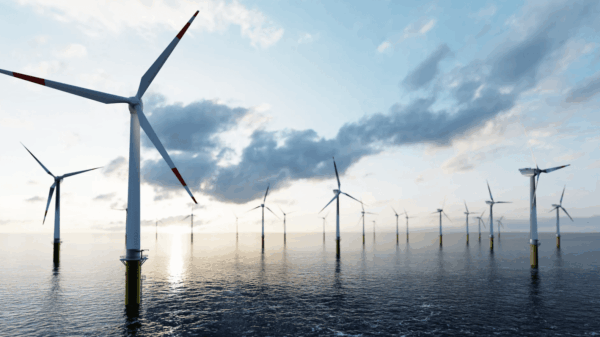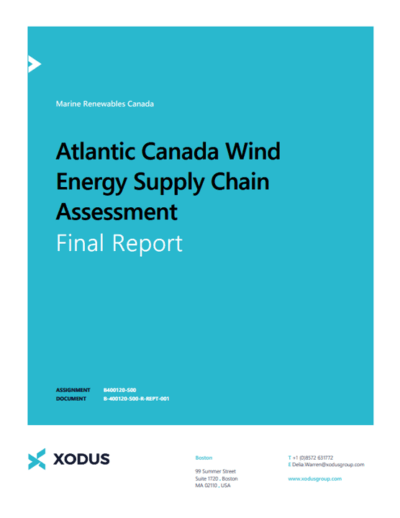Atlantica recently interviewed Elisa Obermann, Executive Director of Marine Renewables Canada, about their recently released Atlantic Wind Energy Supply Chain Assessment and the current state of offshore wind in Canada.
Q: Tell us about Marine Renewables Canada. What do you do in the energy sector?
A. Marine Renewables Canada is a national association with a mandate to advance offshore wind, tidal, wave and river current energy. Along with clean electricity potential, growth of the sector can spur economic opportunities by capitalizing on capabilities already present in other sectors such as offshore oil and gas, shipbuilding, defense, and marine transportation. We represent 180 members, including technology and project developers, suppliers, utilities, Indigenous organizations, researchers, and communities.
Our vision is that marine renewables will accelerate Canada’s clean energy transformation. To get us there, our mission is to champion Canada’s growing marine renewable energy sector through advocacy, engagement, and education to expand market opportunities across the country and globally.

Elisa Obermann, Executive Director
Q: The potential for offshore wind in Nova Scotia has been a hot topic in the media. Can you share more about the potential for this sector in the region and its timeline?
A. Atlantic Canada has some of the world’s strongest and most consistent winds. While the focus has traditionally been on onshore wind, attention is now shifting to the huge potential of offshore wind. With hundreds of gigawatts of untapped resources, ideal conditions for both fixed and floating wind, and decades of offshore expertise from other ocean industries, we’re well positioned to get started.
As Canada works toward its clean energy and decarbonization goals, we’ll need two to three times more clean electricity. Offshore wind can help meet that demand—powering not just coastal regions, but other parts of Canada. It can also support clean hydrogen production and help decarbonize heavy industries like steel and data centres.
Across the region, governments are taking important steps to advance offshore wind development, like the regional assessments conducted for both Nova Scotia and Newfoundland and Labrador’s offshore, and the joint management model established under the amended Accord Acts. With an initial procurement target of 5 GW by 2030 and a first call for bids scheduled for later in 2025, Nova Scotia is already attracting strong international interest.

Shared with permission from Marine Renewables Canada.
Momentum in the sector is driven by a combination of strong policy signals, growing industry expertise, community engagement, and the increasing urgency to reduce emissions while strengthening energy independence. Furthermore, there’s a growing recognition that offshore wind and marine renewable energy like tidal and wave energy can create high-value employment, enable industrial diversification, and foster sustainable economic growth across coastal and Indigenous communities in Canada.
Q: MRC recently released a new report on the supply chain opportunities through onshore and offshore wind development. What opportunities does development of wind energy pose for local businesses?
A. Building a strong, competitive supply chain is key to growing Canada’s offshore wind sector. Atlantic Canada already has a head start, with many experienced suppliers from the offshore and marine industries—some of whom are already working in the international offshore wind market. For example, several ports and suppliers in Atlantic Canada have been supporting and servicing offshore wind developments in the United States and experience gained through this work will undoubtedly benefit the sector in Canada as it ramps up.
That said, offshore wind is still new for many local businesses, and even seasoned players may face challenges adapting to the domestic market. To help prepare, Marine Renewables Canada commissioned a supply chain assessment with support from Atlantic Canada Opportunities Agency (ACOA) and the provinces of Nova Scotia and Prince Edward Island to ensure that economic and social benefits are maximized regionally.
The Atlantic Wind Energy Supply Chain Assessment, led by Xodus Group and a team of local consultants, highlights supply chain and workforce opportunities in greater depth – identifying the capabilities that already exist in the region, where there are gaps, and how stakeholders can collaborate to seize local benefits and enable the industry’s expansion.
Q: Give us a breakdown of key findings and recommendations from the report.

A. Let’s start with growing workforce demand: Offshore wind projects could create up to 6,000 jobs at peak under a medium scenario of 7.5 GW by 2050 – reflecting strong employment potential across the region.
In terms of supply chain strengths, Atlantic Canada is already well-positioned, with a skilled workforce and established companies in marine operations, logistics, and environmental consulting. Among companies assessed, roughly 21–28% for offshore wind applicability were identified as directly able to contribute their expertise and services – with many more companies poised to grow their capabilities alongside industry expansion.
Another important aspect of the assessment was understanding how Indigenous and diverse-owned businesses could participate and benefit. Indigenous businesses and organizations bring unique strengths, from land stewardship to community engagement, and are well-placed to become equity partners and suppliers. According to the assessment, 16% of companies in the region are Indigenous- or diversity-owned, which builds a strong foundation for further collaboration.
While there’s a strong base to build upon, additional investment in training, manufacturing, and policy support can maximize the industry’s benefits. The assessment’s recommendations include strengthening the ecosystem of suppliers, fostering Indigenous participation, developing workforce skills, improving policy incentives, and advancing innovation across the sector.
Q: How can stakeholders get involved or learn more?
A. Marine Renewables Canada is a platform for collaboration, education, policy development, and industry networking. We welcome companies, innovators, Indigenous groups, policy makers, community members, and investors to join us in developing a strong and sustainable marine renewable energy industry for Canada’s future.
Visit our website to learn more and get in touch: https://marinerenewables.ca/
Make sure to attend our expanded 2025 conference and exhibition in Halifax, Nova Scotia on November 12-14. The event will bring together leading minds from across Canada and the world to explore new opportunities and chart the future of the industry.

